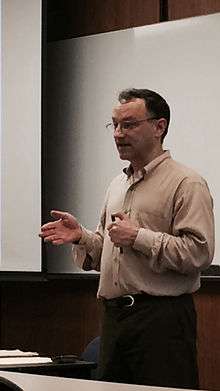David O. Meltzer
David Owen Meltzer (born 1964) is a Professor of Medicine at the University of Chicago. He holds faculty appointments in the Department of Medicine, Department of Economics and the Harris School of Public Policy Studies. He is Chief of the Section of Hospital Medicine at the University of Chicago Medicine, and is the Director of the Center for Health and the Social Sciences (CHeSS), as well as the Director of the Urban Health Lab in Chicago, IL.[1] In 2015 he was appointed a member of the faculty for the forthcoming Barack Obama Presidential Center which will be located in Chicago's South Side.
David O. Meltzer | |
|---|---|
 Meltzer lecturing in Chicago, May 2015 | |
| Born | David Owen Meltzer |
| Institution | University of Chicago |
| Field | Health economics Hospital medicine |
| Alma mater | Yale University University of Chicago |
| Influences | Gary Becker Sherwin Rosen |
Meltzer was elected to the Institute of Medicine (IOM) in 2015 and has served on several committees,[2] including the Committee for Organ Procurement and Transplantation Policy.[3] He is also a member of the Methodology Committee for the Patient-Centered Outcomes Research Institute (PCORI).[4] Finally, he serves on the 2nd U.S. Panel on Cost-effectiveness in Health and Medicine.[5]
Education
David Meltzer attended elementary school and high school at the University of Chicago Lab School in Chicago, IL. He went to college at Yale University in New Haven, CT and double-majored in Economics and Molecular Biophysics and Biochemistry.
After college he matriculated to the medical scientist training program at the University of Chicago where he earned an M.D. from the Pritzker School of Medicine as well as a Ph.D. in Economics. He developed his dissertation on the "Mortality Decline, the Demographic Transition, and Economic Growth" under the mentorship of Nobel-winning economist Gary Becker as well as Sherwin Rosen.[6] Upon graduating from University of Chicago in 1992 he entered a residency program in Internal Medicine at Brigham and Women's Hospital (Harvard Medical School) in Boston, MA, where he simultaneously served as a Faculty Research Fellow at the National Bureau of Economic Research.
Career
He returned to the University of Chicago as a member of the faculty in 1996. He has amounted a number of important contributions in the areas of medicine and health economics.
Health economics
As a health economist, Meltzer has made major contributions to the fields of medical Cost-effectiveness analysis and value of information analysis. His seminal paper about accounting for future costs which appeared in the Journal of Health Economics argued for including both direct and indirect medical costs related to chronic illness in both the numerator and denominator components of cost-effectiveness.[7] He has also systematized the use of value of information analysis to prioritize research funding by subject area.[8]
Hospital medicine
He is the founding Chief of the Section of Hospital Medicine at University of Chicago Medicine, which is a division in the Department of Medicine which staffs hospitalist physicians. It is one of the oldest and largest such divisions among academic medical centers in the country. Early in its conception, he began a multi-institutional clinical trial known as the Hospitalist Study.[9] Today it is the largest collection of data on performance of Hospital medicine, which has shown improvements in care as a result of hospitalist intervention.[10]
More recently, Meltzer received a prestigious Centers for Medicare and Medicaid Innovations (CMMI) award to study the Implications of a "Comprehensive Care Program" in which hospitalists physicians and advanced-practice providers follow-up with hospitalized patients in the home healthcare setting to reduce rehospitalization.[11] For his work in this field he received the Society of Hospital Medicine's Award for Excellence in Research.
Other notable research studies where Meltzer is involved are the Oral Health Study and the CAPriCORN Project.[12]
Personal
Meltzer resides in Chicago with his wife Vineet Arora and daughter Sonia.
External links
References
- "$10 million Pritzker gift helps U. of C. expand evidence-based labs projects". Chicago. 8 March 2015.
- http://nam.edu/nam-elects-80-new-members/
- Gibbons RD, Meltzer D, Duan N. Waiting for organ transplantation. Institute of Medicine Committee on Organ Transplantation. Science. 2000 Jan 14;287(5451):237-8.
- "David O. Meltzer, MD, PhD". pcori.org.
- "2nd Cost-Effectiveness Panel Web Site". ucsd.edu. Archived from the original on 2015-05-04. Retrieved 2015-08-24.
- "Archived copy" (PDF). Archived from the original (PDF) on 2016-06-24. Retrieved 2015-08-25.CS1 maint: archived copy as title (link)
- Meltzer, David. "Accounting for Future Costs in Medical Cost-Effectiveness Analysis." Journal of Health Economics 16 (1): 33-64, 1997.
- Ties Hoomans. "Systematizing the Use of Value of Information Analysis in Prioritizing Systematic Reviews". nih.gov.
- "A Multicenter Trial of Academic Hospitalists". clinicaltrials.gov.
- Meltzer DO, Chung JW. Hospital care and medical utilization after discharge. Ann Intern Med. 2011 Nov 15;155(10):719-20
- Meltzer DO, Ruhnke GW. Redesigning care for patients at increased hospitalization risk: the Comprehensive Care Physician model. Health Aff (Millwood). 2014 May;33(5):770-7
- "SHMLogin". hospitalmedicine.org.